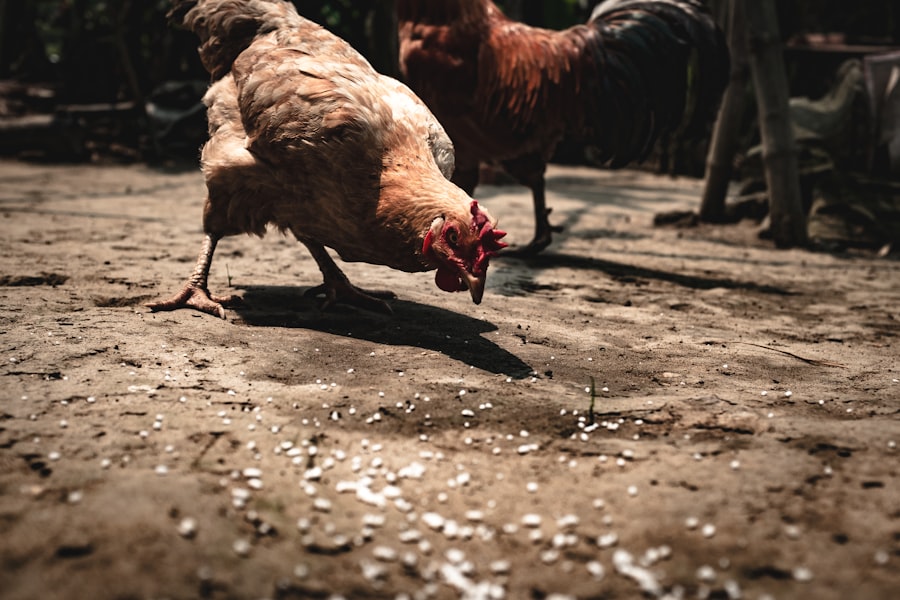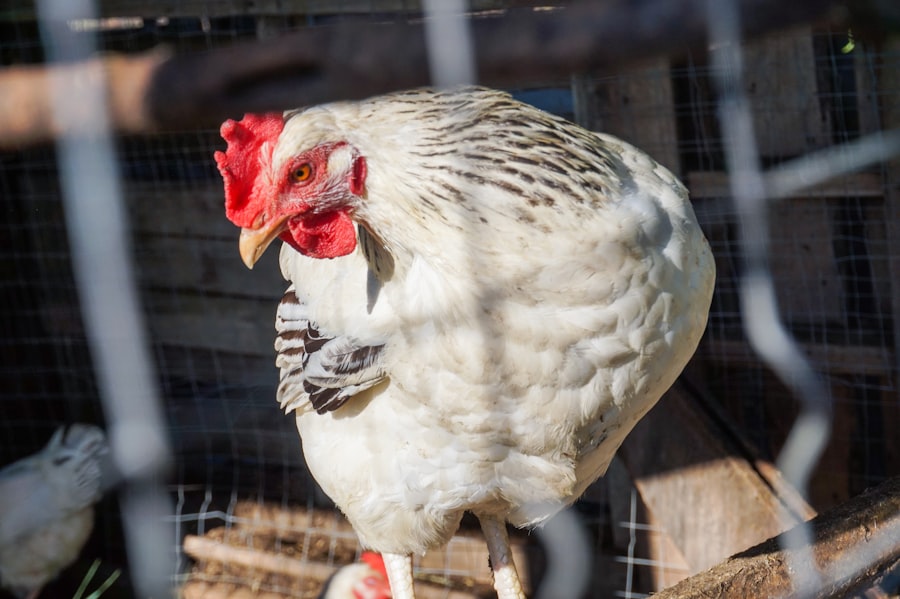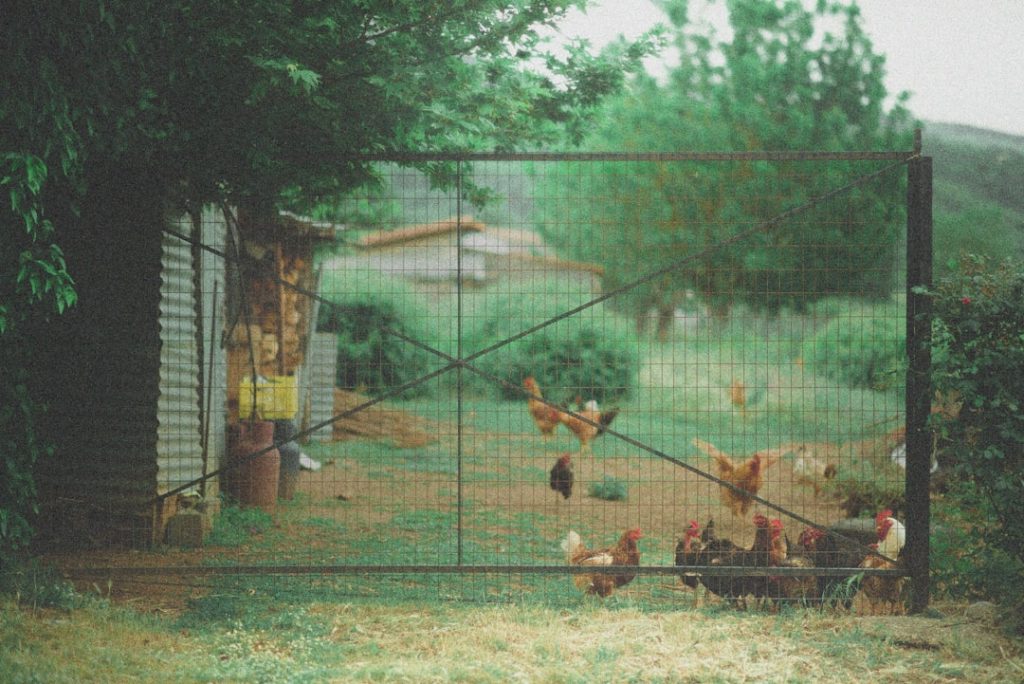Understanding chicken behavior is essential for optimal care. Chickens are social creatures that flourish in flocks, exhibiting a natural pecking order with hierarchical relationships. Providing an appropriate environment allows them to establish and maintain this social structure without excessive aggression.
Chickens possess innate instincts for foraging, dust bathing, and roosting, and facilitating these behaviors is crucial for their well-being. Chickens demonstrate high intelligence and complex social dynamics. They can form strong attachments to their human caretakers and fellow flock members.
Recognizing their body language and vocalizations enables caregivers to identify signs of distress, illness, or contentment. Observing chicken behavior helps in detecting stress, boredom, or the need for environmental enrichment. A comprehensive understanding of chicken behavior is fundamental to ensuring their health and happiness.
Table of Contents
- 1 Providing Adequate Shelter and Space
- 2 Implementing Proper Fencing
- 3 Keeping Chickens Entertained and Engaged
- 4 Providing a Balanced Diet
- 5 Supervising Free Range Time
- 6 Addressing Behavioral Issues
- 7 FAQs
- 7.1 What are some effective ways to keep chickens from wandering?
- 7.2 What type of fencing is best for keeping chickens from wandering?
- 7.3 How can I create a designated chicken area to prevent wandering?
- 7.4 What kind of enrichment and entertainment can help prevent chickens from wandering?
- 7.5 How much space and resources do chickens need to prevent wandering?
Key Takeaways
- Chickens are social animals and have a complex social structure, so understanding their behavior is important for their well-being.
- Providing adequate shelter and space is crucial for the health and comfort of chickens, as overcrowding can lead to stress and aggression.
- Proper fencing is essential to keep chickens safe from predators and to prevent them from wandering into areas where they shouldn’t be.
- Keeping chickens entertained and engaged with toys, perches, and access to the outdoors can help prevent boredom and negative behaviors.
- A balanced diet is key to keeping chickens healthy, so it’s important to provide them with a variety of nutrients through their feed and access to foraging opportunities.
- Supervising free range time is important to ensure the safety of the chickens and to prevent them from causing damage to gardens or neighboring properties.
- Addressing behavioral issues promptly and effectively is important to maintain a harmonious and healthy flock.
Providing Adequate Shelter and Space
Natural Behaviors and Needs
When it comes to providing shelter for chickens, it’s essential to consider their natural behaviors and needs. A well-ventilated coop with plenty of space for roosting and nesting is vital. The coop should also be predator-proof to keep your chickens safe from potential threats.
A Clean and Healthy Environment
Additionally, providing a clean and dry environment is crucial for preventing health issues such as respiratory infections and mites. In terms of space, chickens require ample room to move around and express their natural behaviors. Overcrowding can lead to stress, aggression, and an increased risk of disease.
Space Requirements
The general rule of thumb is to provide at least 2-3 square feet of space per chicken inside the coop, and 8-10 square feet per chicken in the outdoor run. However, more space is always better if possible. Providing adequate shelter and space is essential for the overall well-being of your chickens.
Implementing Proper Fencing

Proper fencing is essential for keeping your chickens safe and secure. It’s important to choose fencing that is sturdy and predator-proof. This can include hardware cloth, welded wire, or chain link fencing.
The fencing should also be buried at least 12 inches into the ground to prevent predators from digging underneath. In addition to keeping predators out, proper fencing also helps to keep your chickens contained within their designated area. This can prevent them from wandering into areas where they may be at risk of harm or causing damage to gardens or neighboring properties.
Regularly inspecting and maintaining the fencing is important to ensure that it remains effective in keeping your chickens safe.
Keeping Chickens Entertained and Engaged
Chickens are curious and active animals that benefit from mental and physical stimulation. Providing them with enrichment activities can help prevent boredom and reduce stress-related behaviors such as feather picking or aggression. There are many ways to keep chickens entertained and engaged, such as providing them with perches, dust bathing areas, and objects to peck at.
You can also offer them a variety of treats and toys to keep them stimulated. This can include hanging treats such as cabbage or corn on a string, or providing them with puzzle feeders that require them to work for their food. Additionally, allowing them access to a diverse outdoor environment with plenty of vegetation and insects to forage can provide endless entertainment for your flock.
Providing a Balanced Diet
A balanced diet is essential for the health and well-being of your chickens. Their diet should consist of high-quality poultry feed that is specifically formulated for their nutritional needs. This feed should contain a balance of protein, carbohydrates, vitamins, and minerals to support their overall health and egg production.
In addition to poultry feed, chickens also benefit from access to fresh water at all times. You can also supplement their diet with treats such as fruits, vegetables, mealworms, and kitchen scraps in moderation. It’s important to avoid feeding them foods that are toxic to chickens, such as avocado, chocolate, or raw beans.
Providing a balanced diet is crucial for ensuring that your chickens receive the nutrients they need to thrive.
Supervising Free Range Time

Setting Boundaries
You can do this by setting up temporary fencing or using chicken tractors to limit their access to certain areas. This will help prevent them from getting into trouble and allow you to maintain control over their free range experience.
Monitoring Behavior
Supervising free range time also allows you to monitor their behavior and intervene if necessary. For example, you can prevent them from wandering into areas where they may be at risk of predation or getting into mischief.
Identifying Hazards
Additionally, supervising free range time allows you to observe their foraging behaviors and identify any potential hazards in the environment. This will enable you to take proactive steps to mitigate any risks and create a safe and healthy environment for your chickens.
Addressing Behavioral Issues
Like any animal, chickens can exhibit behavioral issues that may require intervention. Common behavioral issues in chickens include aggression, feather picking, egg eating, and excessive vocalization. It’s important to address these issues promptly to prevent them from escalating and impacting the overall well-being of your flock.
Addressing behavioral issues may involve making changes to their environment, such as providing more space or enrichment opportunities. It may also involve identifying and addressing any underlying health issues that could be contributing to the problem. In some cases, seeking advice from a poultry veterinarian or animal behaviorist may be necessary to develop a plan for addressing the issue effectively.
In conclusion, understanding chicken behavior and providing them with adequate shelter, space, fencing, enrichment, diet, and supervision are all essential components of responsible chicken care. By prioritizing these aspects of care, you can ensure that your chickens lead happy, healthy lives while also minimizing potential behavioral issues or health problems.
If you’re looking for tips on how to keep chickens from wandering, you might also be interested in this article on how to care for goslings. It’s important to provide a safe and secure environment for all types of poultry, and this article offers valuable insights on how to do just that for goslings.
FAQs
What are some effective ways to keep chickens from wandering?
Some effective ways to keep chickens from wandering include using fencing, creating a designated chicken area, providing enrichment and entertainment, and ensuring they have enough space and resources.
What type of fencing is best for keeping chickens from wandering?
The best type of fencing for keeping chickens from wandering is typically a sturdy wire or mesh fence that is at least 6 feet tall and buried at least 6 inches into the ground to prevent digging.
How can I create a designated chicken area to prevent wandering?
You can create a designated chicken area by using fencing to enclose a specific area of your yard or property, providing shelter, food, and water within that area, and ensuring it is secure and predator-proof.
What kind of enrichment and entertainment can help prevent chickens from wandering?
Enrichment and entertainment for chickens can include providing them with toys, perches, and areas to dust bathe, as well as allowing them to free-range in a supervised manner to satisfy their natural instincts.
How much space and resources do chickens need to prevent wandering?
Chickens need at least 4 square feet of space per bird in their coop, as well as access to a secure outdoor area for foraging and exercise. They also require a balanced diet, fresh water, and protection from predators to prevent wandering.
Meet Walter, the feathered-friend fanatic of Florida! Nestled in the sunshine state, Walter struts through life with his feathered companions, clucking his way to happiness. With a coop that’s fancier than a five-star hotel, he’s the Don Juan of the chicken world. When he’s not teaching his hens to do the cha-cha, you’ll find him in a heated debate with his prized rooster, Sir Clucks-a-Lot. Walter’s poultry passion is no yolk; he’s the sunny-side-up guy you never knew you needed in your flock of friends!







